What is Supportive Care ABA?

Understanding Supportive Care ABA: A Comprehensive Approach
Supportive Care ABA (Applied Behavior Analysis) offers a tailored, evidence-based intervention designed to support individuals with autism spectrum disorder (ASD) and other developmental disabilities. Rooted in science and characterized by a collaborative, holistic approach, it aims to foster meaningful growth, independence, and improved quality of life for those it serves.
Defining Supportive Care ABA and Its Core Principles
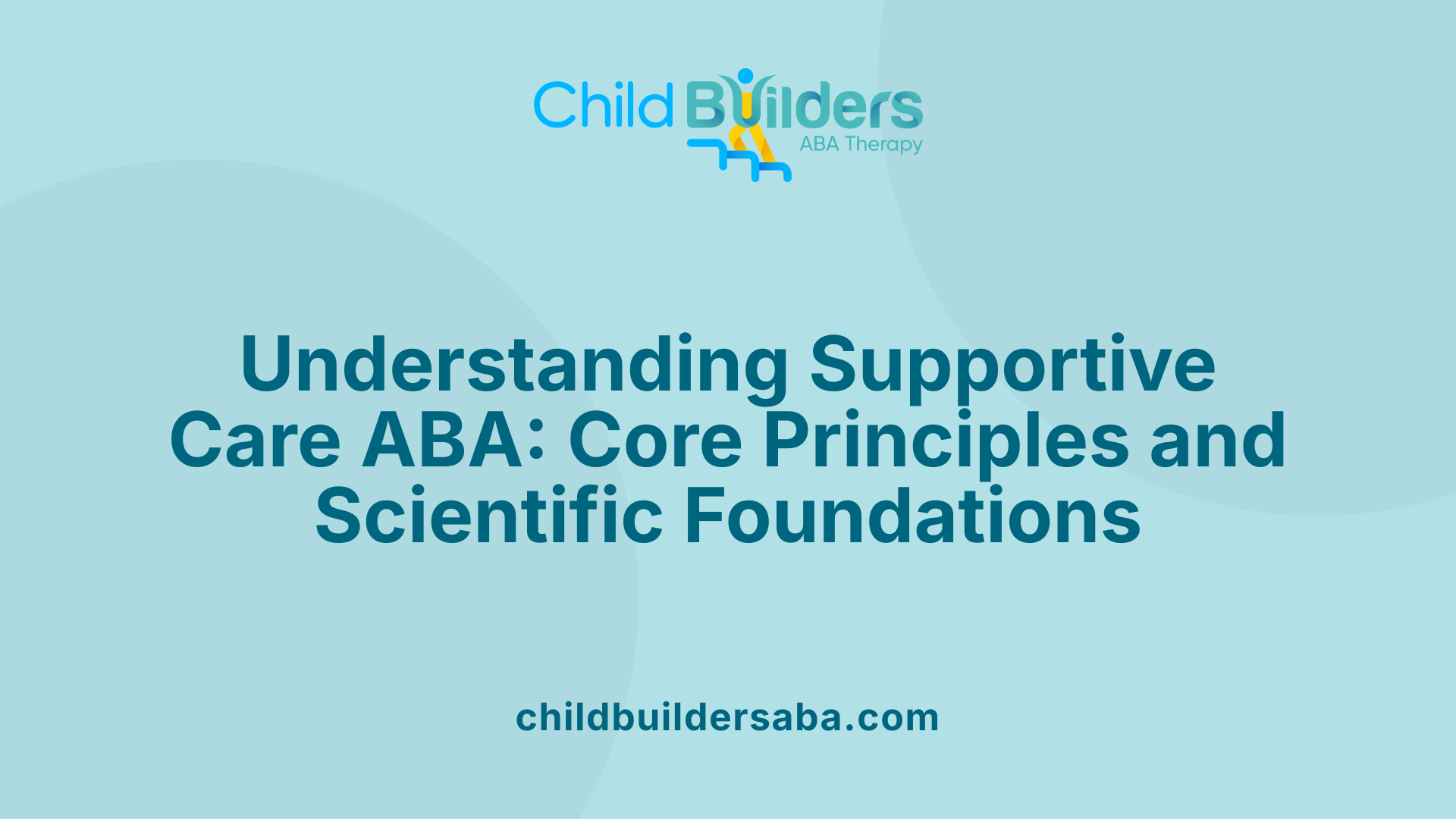
What is Supportive Care ABA and what are its core principles?
Supportive Care ABA is a specialized form of Applied Behavior Analysis (ABA) designed to assist individuals with autism spectrum disorder (ASD) and other developmental disabilities. This therapy emphasizes a scientific and systematic approach rooted in behavioral science to promote meaningful growth.
The core of Supportive Care ABA involves assessing each individual’s unique needs through detailed evaluations. Based on these assessments, tailored treatment plans are developed that focus on improving essential skills such as communication, social interaction, and daily living activities.
Interventions incorporate evidence-based techniques like positive reinforcement, prompting, shaping, and generalization to help embed new behaviors effectively. Regular data collection is a vital part of the process, allowing therapists and caregivers to track progress and modify approaches as needed.
A collaborative effort among parents, caregivers, therapists, educators, and other professionals ensures that support remains consistent and holistic. Extensive caregiver training empowers families to continue skill development at home, fostering ongoing growth beyond therapy sessions.
Overall, Supportive Care ABA combines scientific rigor with compassionate, goal-oriented strategies to help individuals thrive. Its principles center on evidence-based practices, individualized care, and continuous assessment—all aimed at improving quality of life and fostering independence.
Benefits of Supportive Care ABA for Children with Autism
What are the benefits of Supportive Care ABA therapy for children with autism?
Supportive Care ABA therapy provides a range of positive effects for children with autism. One of its primary benefits is the improvement of social skills, helping children connect better with peers and adults. Alongside this, communication abilities and language development are significantly enhanced, which supports better daily interactions.
The therapy also emphasizes building essential life skills such as dressing, toileting, and personal self-care. These skills foster independence and bolster the child's confidence as they learn to manage routine tasks on their own.
Supportive Care ABA employs personalized treatment plans based on thorough assessments. These plans use proven techniques like positive reinforcement, prompting, shaping, and generalization, which help children adopt new behaviors and skills effectively.
Research indicates that early and intensive ABA interventions can lead to more favorable developmental outcomes. When therapy begins promptly, children tend to acquire foundational skills more quickly, creating a stronger base for future learning.
The approach also supports the reduction of challenging behaviors, such as aggression or tantrums, by teaching children better ways to communicate their needs and manage emotions. Furthermore, tailored programs prepare children for real-world scenarios, which boosts their chances of achieving long-term independence.
Ultimately, Supportive Care ABA aims to nurture growth in a playful, supportive, and evidence-based manner, helping children thrive academically, socially, and emotionally. Many parents report noticeable improvements in their child's behavior, social engagement, and daily functioning, affirming the therapy's transformative impact.
Delivery and Functioning of Supportive Care ABA Services
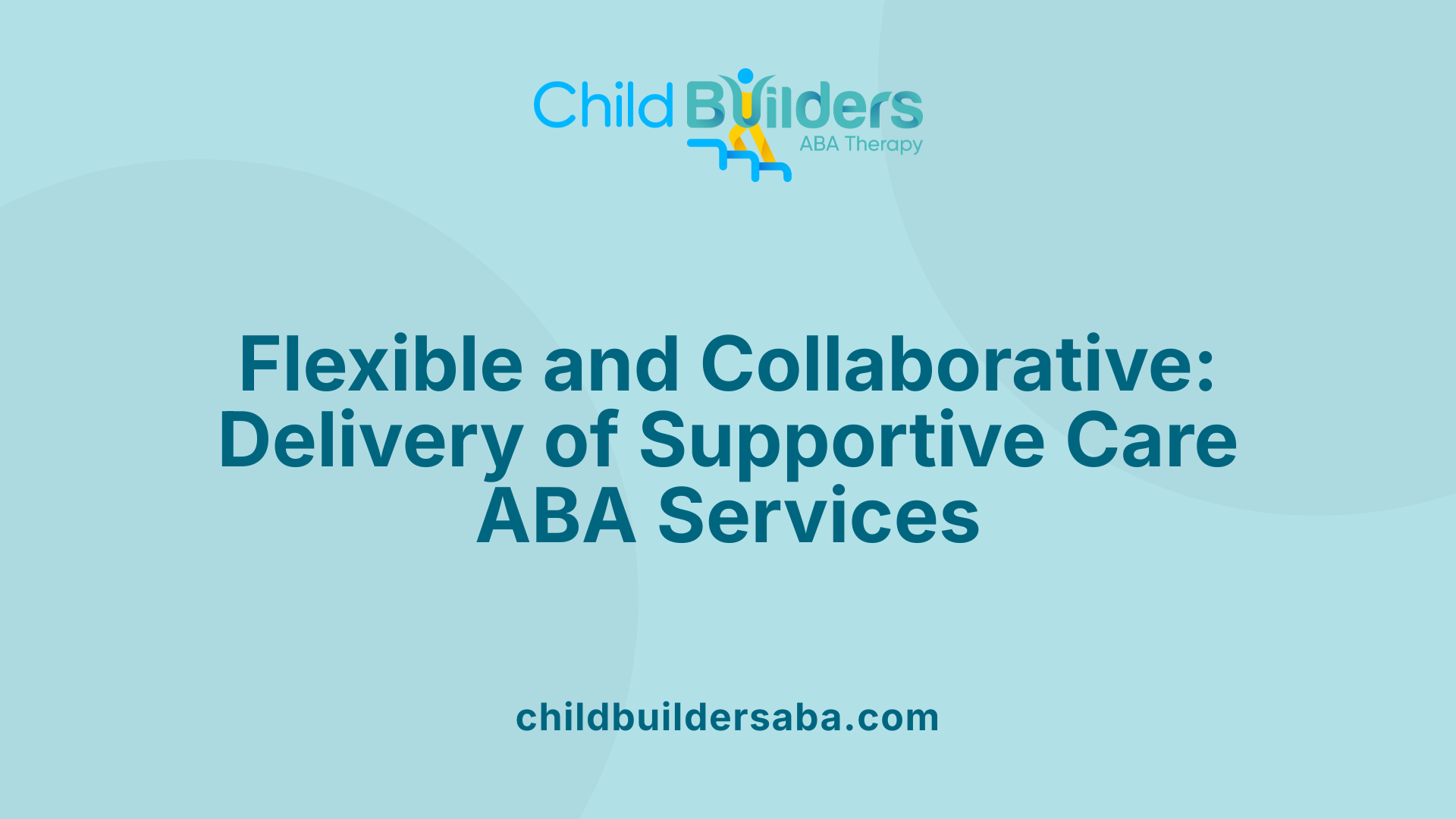 Supportive Care ABA services are delivered through a variety of methods tailored to meet the needs of individuals with autism spectrum disorder (ASD) and other developmental disabilities. Therapy sessions are often conducted in the comfort of the child's home, within community settings, or via virtual platforms. This flexibility allows for real-life practice in environments where behaviors naturally occur, promoting generalization and practical skill development.
Supportive Care ABA services are delivered through a variety of methods tailored to meet the needs of individuals with autism spectrum disorder (ASD) and other developmental disabilities. Therapy sessions are often conducted in the comfort of the child's home, within community settings, or via virtual platforms. This flexibility allows for real-life practice in environments where behaviors naturally occur, promoting generalization and practical skill development.
In addition to in-person interactions, telehealth has become an essential tool, enabling therapists to work remotely with clients. These virtual sessions are planned to be interactive and engaging, providing consistent support regardless of location. This approach increases access to services, especially for families in remote areas or with transportation challenges.
To ensure effective learning, therapists break down complex skills into small, manageable steps. These are reinforced using evidence-based techniques such as positive reinforcement, prompting, shaping, and generalization. Positive reinforcement encourages desired behaviors, while prompting and shaping guide the client towards independence. Generalization ensures that skills learned in therapy transfer to different settings and situations.
Successful therapy depends heavily on a collaborative approach. Families, caregivers, educators, and other professionals work together, sharing insights and strategies to support the child's progress. This teamwork ensures consistency across environments, which is critical for meaningful improvement.
Every individual receives an assessment that informs a personalized treatment plan. These plans are highly tailored, taking into account the person’s unique strengths, needs, and goals. Regular data collection and ongoing analysis allow therapists to monitor progress closely. Based on this data, treatment strategies are refined to maximize effectiveness.
Caregiver training is also a fundamental element of Supportive Care ABA. Parents and caregivers learn how to apply reinforcement techniques, prompts, and other strategies at home, extending therapy benefits beyond structured sessions. This empowerment fosters consistency and promotes the development of new skills in everyday life.
Overall, Supportive Care ABA embodies a comprehensive, flexible, and collaborative approach. By integrating diverse delivery methods, individual assessments, caregiver involvement, and data-driven practices, it aims to support children in building meaningful skills toward greater independence and well-being.
Methods and Approaches in Supportive Care ABA
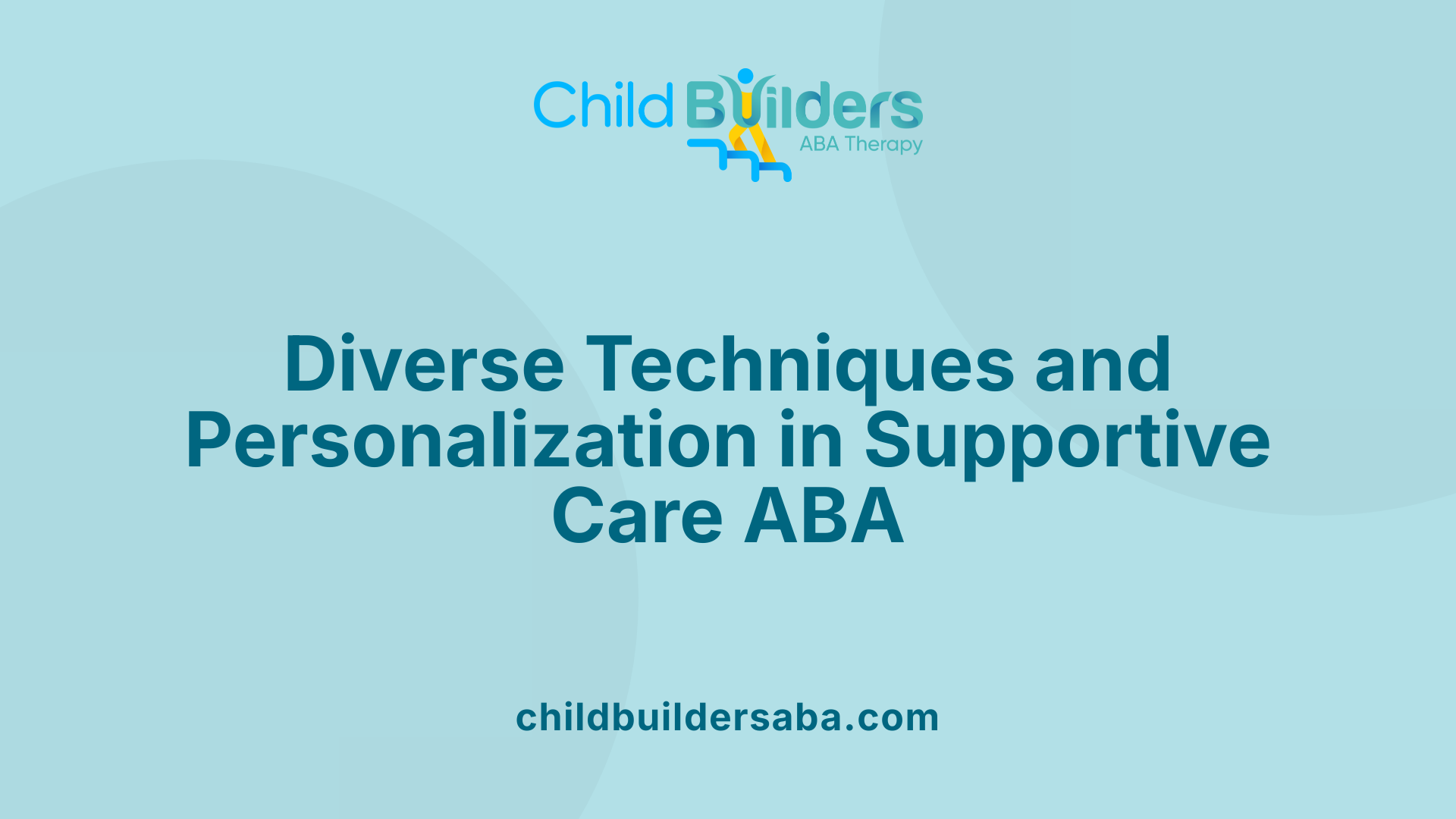
What methods and approaches are used in Supportive Care ABA therapy?
Supportive Care ABA (Applied Behavior Analysis) employs a blend of structured and naturalistic techniques to help individuals with autism and other developmental disabilities develop essential skills. These methods are rooted in evidence-based practices that emphasize real-world applicability.
One foundational approach is Discrete Trial Training (DTT), which involves breaking down skills into small, manageable steps and teaching them through repetitive, controlled trials. This method promotes mastery of specific tasks and behaviors.
Another important technique is Pivotal Response Training (PRT), which targets pivotal areas such as motivation, responsibility, and self-management. By focusing on these core skills, PRT leads to broad improvements in social and communication abilities.
Functional Communication Training (FCT) is also utilized to help individuals replace challenging behaviors with appropriate communication methods. This can include verbal, gestural, or augmentative communication strategies.
Task Analysis and Chaining are used to teach complex skills by breaking them into smaller steps and linking them together. Natural Environment Teaching (NET), on the other hand, emphasizes teaching skills within everyday settings, making learning more relevant and promoting generalization.
In addition to these methods, Supportive Care ABA incorporates visual supports like picture schedules and social stories to enhance understanding. Video modeling is used to demonstrate behaviors, while role-playing provides opportunities for practice in a controlled, engaging manner.
Parents and caregivers are central to this approach. Training sessions empower them to reinforce skills consistently across various settings, ensuring continuity and effectiveness of the therapy.
Individual programs are highly tailored—ranging from comprehensive, intensive treatment plans for individuals with more significant needs to targeted interventions focusing on specific behaviors or skills.
Progress is meticulously monitored through detailed data collection and ongoing assessments. This continuous tracking informs necessary adjustments, ensuring that interventions remain aligned with each individual's evolving needs.
By combining these diverse strategies, Supportive Care ABA creates a dynamic, personalized approach that fosters growth and independence, with positive outcomes reported regularly by families and practitioners.
Goals and Purpose of Supportive Care ABA Programs
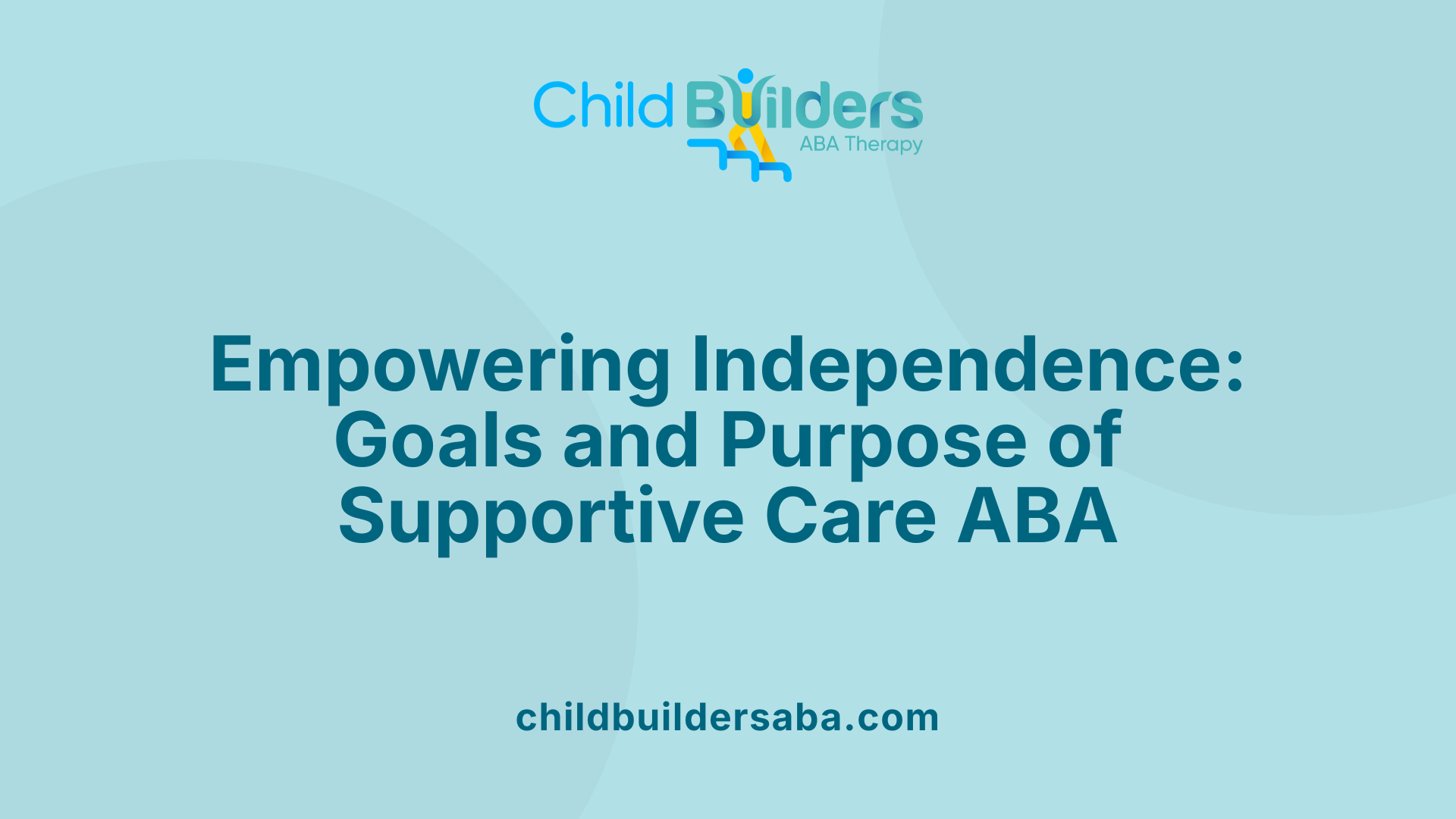
What is the purpose and goal of Supportive Care ABA programs?
Supportive Care ABA is designed to support individuals with autism spectrum disorder (ASD) and other developmental disabilities by focusing on developing essential skills that foster independence and enhance their quality of life.
The main aim is to improve a wide range of abilities including communication, social interactions, academic readiness, motor skills, and self-care routines. At the same time, these programs work to reduce challenging behaviors that may interfere with learning or daily functioning.
A core feature of Supportive Care ABA is the use of evidence-based methods like positive reinforcement, prompting, shaping, and strategies for generalization. These techniques are applied flexibly and tailored to each person’s unique needs and developmental level.
Progress is continuously tracked through data collection and regular assessments. This allows therapists and caregivers to adjust strategies and ensure that each individual’s growth is progressing in a meaningful way.
Facilitating skill generalization and encouraging self-advocacy are also crucial goals. This helps individuals apply their new skills across different environments and advocate for their needs confidently.
Ultimately, Supportive Care ABA aims to empower individuals to lead lives of greater independence, build meaningful social connections, and participate fully in their communities. Its holistic, person-centered approach fosters the development of skills that pave the way for long-term success and fulfillment.
| Focus Area | Goals | Methods & Strategies |
|---|---|---|
| Functional Skills | Promote independence in daily activities | Positive reinforcement, prompting, shaping |
| Communication | Enhance expressive and receptive language skills | Play-based, naturalistic interactions |
| Social Skills | Support peer interactions and relationship building | Social skills groups, role-playing |
| Behavior Reduction | Minimize challenging behaviors | Data-driven adjustments, reinforcement of positive behaviors |
| Skill Generalization | Ensure abilities transfer across settings | Varied practice environments, caregiver training |
| Self-Advocacy | Cultivate confidence in expressing needs | Self-monitoring, decision-making activities |
Building a Supportive and Empowering Framework
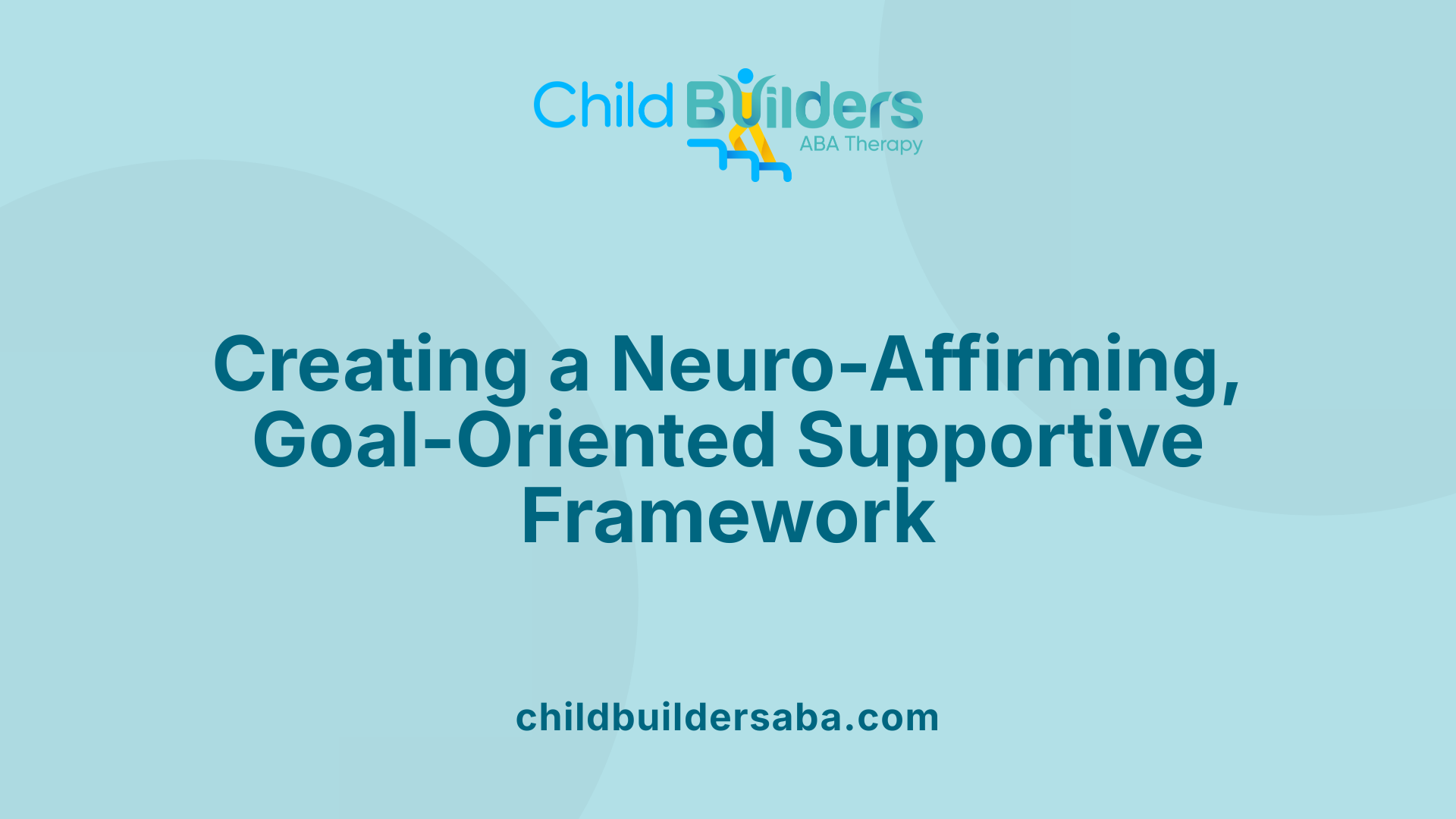
Why is a neuro-affirming, supportive, and goal-oriented approach important?
Supportive Care ABA emphasizes a positive, respectful understanding of individuals with autism. This approach recognizes each person's unique abilities and promotes growth through compassionate, individualized strategies. Being neuro-affirming helps foster confidence and self-acceptance, encouraging progress without pressure or stigma. Setting clear, personalized goals ensures that therapy remains relevant and motivating, guiding individuals toward meaningful life skills.
How do caregivers, therapists, and educators collaborate?
A team-based approach is central to Supportive Care ABA. Parents, caregivers, teachers, and therapists work together closely to create a consistent environment. This collaboration ensures strategies applied in therapy are reinforced at home and in school, promoting skill retention and generalization. Regular communication and shared understanding help align efforts and adapt plans based on ongoing assessment.
Why is caregiver training important?
Training caregivers allows them to reinforce learned skills outside therapy sessions. Through education and coaching, caregivers become confident in applying positive reinforcement, prompting, and shaping techniques. This ongoing support extends the impact of therapy, empowering families to foster independence and develop new skills in natural settings.
How does data guide therapy?
Data collection is fundamental in tracking progress and making informed decisions. Therapists regularly record behaviors and skills to identify advances or challenges. Analyzing this information helps refine goals and adapt interventions, ensuring each individual receives the most effective, tailored support.
How does a holistic approach support confidence and independence?
Supportive Care ABA aims to nurture not only skills but also emotional well-being and social participation. Through playful, engaging activities and meaningful interactions, children learn to connect, communicate, and manage emotions. The focus on naturalistic and functional skills encourages children to become more autonomous, contributing to their overall happiness and quality of life.
What is the purpose of Supportive Care ABA programs?
The main purpose of these programs is to help individuals with autism develop essential skills that lead to greater independence and improved well-being. These programs focus on communication, social interaction, self-care, and behavioral management, tailored to each person’s needs. By regularly assessing progress and adjusting strategies, Supportive Care ABA aims to support successful integration into everyday settings and foster personal growth.
Moving Forward with Supportive Care ABA
Supportive Care ABA stands out as a compassionate, scientifically grounded approach that prioritizes personalized support, caregiver involvement, and holistic development. Its focus on functional skills, communication, and social integration equips individuals with autism to navigate life with greater independence and confidence. As research continues and resources become more accessible, Supportive Care ABA is set to play an increasingly vital role in empowering individuals and transforming lives.
References
- What is Supportive Care ABA? What You Need to Know
- ABA Therapy for Autism | Supportive ABA - Empowering Growth ...
- Applied Behavior Analysis (ABA) | Autism Speaks
- From Consultation to Care: Understanding the Role of ABA Agencies
- Qualities in an ABA Therapy Center for Optimal Care and Support
- 6 Life-Changing Benefits of ABA Therapy for Children with Autism
- 5 Benefits of ABA Therapy for Autistic Child
- Why is ABA Therapy Important for Autism Treatment?
- The Benefits of ABA Therapy for Children with Autism





































































































